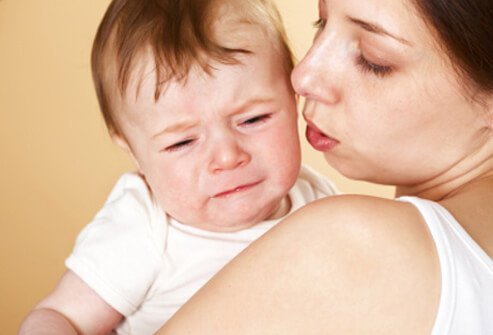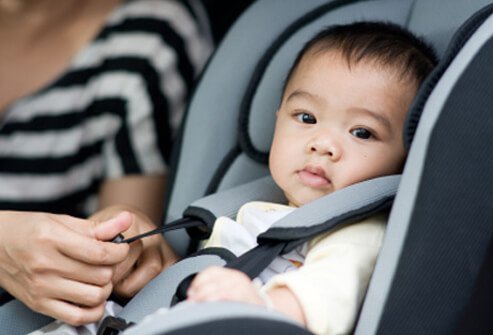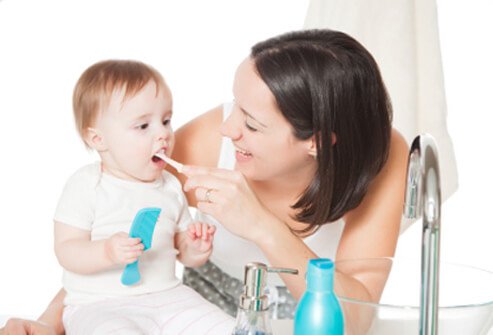Top 10 Parenting Mistakes- Children, Infants, Toddlers, Teens
New Parent Mistakes

It can be nerve-wracking being a new parent. You worry you won't do everything right. Guess what? You won't! Every parent makes mistakes. But there are some common parenting mistakes that might be avoided if you just know to watch out for them. The following slides will discuss some common mistakes new parents make, along with suggestions to avoid making them.
Mistake No. 1: Panicking Over Anything and Everything

A lot of new parents panic at normal things babies do, such as vomiting, crying, or even bowel movements. They wonder if their baby is eating enough or too little, having too many or too few bowel movements, spitting up too often, crying too much. Remember, babies are more resilient than we often realize. Talk to your pediatrician for the things that you really should be concerned about and don't sweat the small stuff.
Mistake No. 2: Not Letting Your Infant Cry It Out

When babies cry, it's a normal parental reaction to want them to stop. We feel like something is wrong and as parents we need to fix it. But crying is part of being a baby. Your baby could be perfectly fine: well fed, clean diapers, rested – and they will still cry. Often, it's ok to let your baby cry it out. However, if your infant cries for more than an hour, or the crying is associated with a fever, rash, or persistent vomiting, call your pediatrician.
Mistake No. 3: Waking Baby Up to Breastfeed

You do not need to wake your baby to breastfeed. If the baby is sleeping through the night, it's best for the baby – and mom – to sleep as well. The baby can breastfeed in the morning.
Mistake No. 4: Confusing Spit-Up and Vomit

Understand the difference between spit-up and vomit. Spit-up may be projectile but it generally comes out of the mouth easily, often with a burp. This is generally not a concern and is normal. Vomiting is more forceful, and it can be more frequent. If your baby has a gastrointestinal virus, he or she may vomit every 30 to 45 minutes. Contact your pediatrician if your infant is vomiting.
Mistake No. 5: Not Sweating a Fever in a Newborn

The normal temperature of babies may range from about 96.8 to 100.3 F. However, if your infant is three months of age or younger, and has a fever of 100.4 F (38.0 C) rectally or higher rectally, it is considered a medical emergency by many pediatricians. Infants' immune systems are not developed enough to fight off many infections. See your pediatrician or go to an emergency department if your newborn has a high fever.
Mistake No. 6: Not Properly Installing the Car Seat

Make sure you install the baby's car seat properly. For new parents, this can seem like a monumental task, but it's important to make sure it's secure. Many local fire stations or Babies "R" Us stores will help you install the seat correctly.
Mistake No. 7: Neglecting Oral Care

Oral care is important even for infants. There are a few steps you can follow to care for your baby's incoming teeth. Once the teeth have erupted through the gums, don't give milk in bed as this increases the risk of developing cavities. Use wet gauze to clean your baby's gums and you can start using a soft children's toothbrush at one year of age. Make sure your child gets adequate fluoride. Most public water systems are fluoridated, but if your town's water is not, ask your dentist about supplements.
Mistake No. 8: Ignoring Your Marriage

Take care of your relationship so you can better care for your infant. Many couples find their focus after a new baby shifts to the baby, naturally, but they neglect their relationship. Having a healthy relationship is more important than ever when you have a newborn added to the family. Stay connected with your partner.
Mistake No. 9: Fighting Too Much (or Too Little) in Front of Your Baby

Be careful about fighting in front of your infant. Even babies who are just a few months old can sense the negative vibes of parents arguing. Snapping at each other after a stressful day is common, but if things start to get intense or conflicts become more frequent be conscious of expressing your anger in front of the baby.
Mistake No. 10: Trusting Unreliable Sources for Parenting Advice

The internet can be a great source of information for new parents, just be careful that the web sites you visit are reputable and credible. WebMD.com, The Centers for Disease Control and Prevention (CDC), and the American Academy of Pediatrics (AAP) are all trusted sites that will provide useful information when you need it.
Top 10 Parenting Mistakes- Children, Infants, Toddlers, Teens
IMAGES PROVIDED BY:
- iStockPhoto
- iStockPhoto
- iStockPhoto
- iStockPhoto
- iStockPhoto
- iStockPhoto
- iStockPhoto
- iStockPhoto
- iStockPhoto
- iStockPhoto
- iStockPhoto
REFERENCES:
- Centers for Disease Control and Prevention (CDC): "Infants & Toddlers."
- Centers for Disease Control and Prevention (CDC): "Parent Information."
- Healthy Children: "Baby 0-12 mos."
© 1996-2022 WebMD, LLC. All rights reserved.
Source slideshow on OnHealth
